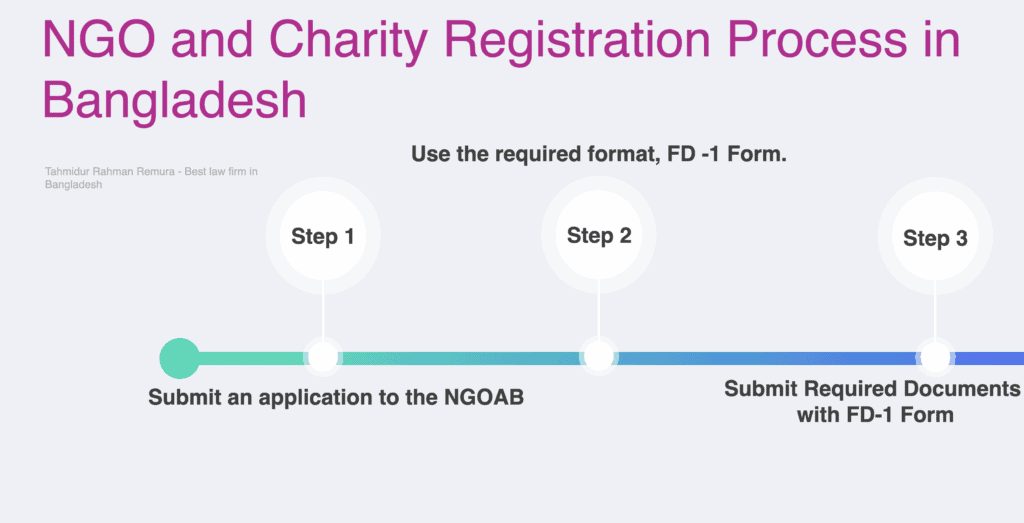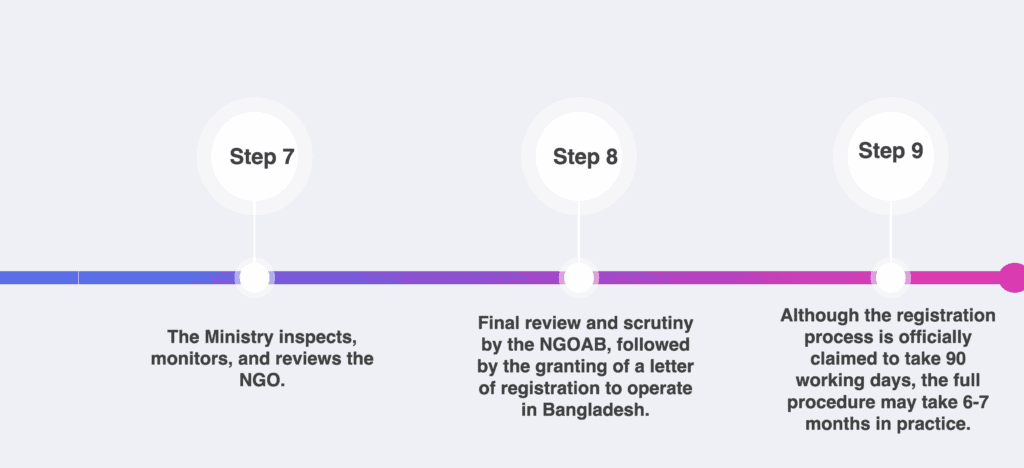Introduction to the NGO and Charity Registration Process in Bangladesh:
Many local and international non-governmental organizations (NGOs) labor tirelessly in Bangladesh to achieve their noble goals in a variety of fields. Many global and national charitable organizations frequently inquire about the registration process for NGOs or charitable organizations. This page discusses the registration procedures for various types of non-governmental organizations (NGOs) in Bangladesh.
Types of NGOs:
- International NGO
- National NGO
NGO Registration:
NGO Affairs Bureau (NGOAB): An international organization registered outside of Bangladesh must be registered with the NGO Affairs Bureau (NGOAB) before it can function in Bangladesh. Furthermore, for an International NGO or charity to collect funds from overseas organizations or institutions, registration with NGOAB is required.
NGO and Charity Registration Procedure:

Step 1:
Submit an application to the NGOAB
Step 02:
Use the required format, FD -1 Form.
Step 03:
Submit Required Documents with FD-1 Form
Step 04:

Pay government fees such as Treasury challans, VAT, and so on.
Step 05:
Application is sent to Ministries
Step 06:
A security check is performed by a law enforcement agency, such as the Special Branch of Police or National Security Intelligence, among others.

Step 07:
The Ministry inspects, monitors, and reviews the NGO.
Step 08:
Final review and scrutiny by the NGOAB, followed by the granting of a letter of registration to operate in Bangladesh.
Step 9:
Although the registration process is officially claimed to take 90 working days, the full procedure may take 6-7 months in practice.
Registration and Renewal have a time limit:
The operational permit for an International NGO is valid for the following ten years, however the documentation must be resubmitted within six months of the expiration date to renew the period for operation in Bangladesh.
Option to operate without being registered:
If an international NGO or charity has not yet been established under NGOAB, there is another route for it to function in this country, which is to collaborate with an international organization that has already been officially registered under the aforementioned Act in Bangladesh. Working under the banner of a larger organization, for example, with or without the related service costs by adhering to the partner organization’s policy, and so on.
Process of National NGO Registration:
NGO Affairs Bureau (NGOAB): In addition to registering with various departments, such as the Department of Social Services, Microcredit Regulatory Authorities, the Department of Women Affairs, the Bangladesh Registrar of Joint Stock Companies and Firms, and so on, local NGOs in Bangladesh must also register with the NGO Affairs Bureau (NGOAB) in order to receive donations from abroad, i.e. foreign organizations or institutions.

The Registration Procedure:
The process of registering a Local NGO is similar to that of registering an International NGO, as previously explained.
MRA (Microcredit Regulatory Authority):
The Microcredit Regulatory Authority (MRA) is the approved central agency in charge of promoting and fostering the microfinance industry, as well as regulating, monitoring, and supervising the microfinance operations of non-governmental organizations (NGOs) in Bangladesh. According to the Microfinance Regulatory Act of 2006, duly registered organizations under the Societies Registration Act of 1860, the Trust Act of 1882, the Voluntary Social Welfare Agencies (Registration and Control) Ordinance of 1961, the Cooperative Societies Act of 2001, and the Company Act of 1994 can apply to the Microcredit Regulatory Authority for a license to operate a micro-credit program.
Concerning Legislation:
- 2006 Microfinance Regulatory Act
- Microcredit Regulations, 2010.
The Registration Procedure:
- Step 01: Submit an application to the authority using the appropriate ‘Annexure A’ form.
- Step 02: Submit all required documentation, including ‘Annexure A’.
- Step 03: The Authority will review the application information and, if satisfied, will require payment of the License Fee.
- Step 04: The Authority will issue the license after receiving the licensing fee from the applicant; however, if the application is rejected, the Authority will notify the applicant in writing within thirty days.
DSS (Department of Social Services):
An NGO or charity can be registered with the Ministry of Social Welfare’s Department of Social Services (DSS). Registration, however, is only required for organizations that will provide welfare services to children, youth, women, families, physically or mentally handicapped, family planning, recreation, civic responsibility, released prisoners, juvenile delinquents, socially handicapped, beggars and the destitute, patients, the elderly or infirm, social work, or coordination of social welfare agencies.
The Registration Procedure:
- Step 01: Obtaining name clearance from the appropriate office.
- Step 02: Submit an application for registration to the authority using ‘Form-B’.
- Step 03: Submit relevant documents along with ‘Form-B’.
- Step 04: Pay government fees such as Treasury challans, VAT, and so on.
- Step 05: Application is forwarded to the appropriate Ministries.
- Step 06: A security check is performed by a law enforcement agency, such as the Special Branch of Police or National Security Intelligence, among others.
- Step 07: The Ministry inspects, monitors, and reviews the NGO.
- Step 08: Review and final examination by the DSS, followed by registration issuance if satisfied.
- Step 09: The registration process through the Department of Social Services may take 5-7 months, depending on the conditions.
DWA (Department of Women’s Affairs):
An organization that wants to work for the welfare of women and children can register with the Department of Women’s Affairs (DWA), which is part of the Ministry of Women and Children Affairs. It has a similar organizational structure to the Department of Social Services (DSS).
Voluntary Social Welfare Agencies (Registration and Control) Ordinance, 1961, and accompanying Rules, 1962.

The Registration Procedure:
The registration process is nearly identical to that of the Department of Social Services, as detailed above under the Voluntary Social Welfare Agencies (Registration and Control) Ordinance, 1961 & associated Rules, 1962.
RJSC (Registrar of Joint Stock Companies and Firms):
An NGO or charity can be established with the Ministry of Commerce’s Bangladesh Registrar of Joint Stock Companies and Firms, and the vast majority of non-profit organizations in Bangladesh have been formed and registered under this broad scope and flexibility to allow for a wide range of operations.
Concerning Legislation:
- The Societies Registration Act of 1860
- Companies Act of 1994.
The following steps are included in the registration process under the Societies Registration Act:
Seven or more people affiliated with a literary, scientific, charitable, or other similar purpose may apply to the Bangladesh Registrar of Joint Stock Companies and Firms to form a society by subscribing to its memorandum of association, which must be accompanied by the society’s rules and regulations.
Step 01:
RJSC issues a name clearance.
Step 02:
Submit an application to RJSC for registration, along with the Memorandum of Association and a Clearance letter, as well as all other essential papers.
Step 03:
Payment of government fees is the third step.
Step 04:
A security check is performed by a law enforcement agency, such as the Special Branch of Police or National Security Intelligence, among others.
Step 05:

Inspection, monitoring, and evaluation of the NGO by the appropriate authorities.
Step 06:
If all requirements are met, the authority will issue a registration.
The following steps are included in the registration process under the Companies Act:
According to Section 28 of the Companies Act, 1994, an association can be incorporated as a non-profit company conforming to the rules and regulations of a company with limited liability after obtaining a license from the relevant authority, namely the Bangladesh Registrar of Joint Stock Companies and Firms under the Ministry of Commerce.
The procedure for obtaining the RJSC registration form is nearly identical to that described above. The government will give a license if it is satisfied that the organization will promote trade, art, science, religion, charity, or any other desirable goals, and that its revenues or income will be used to further those goals without providing any dividends to its members. Under the Companies Act of 1994, these types of welfare-oriented businesses can be formed as companies limited by guarantee.
Registration of Trusts:
‘A trust may be established for any authorized purpose, including charity work,’ according to the legislation. The trustees are in charge of looking after and managing the trust property in order to achieve the goals mentioned in the trust deed.

A Trust can be established for any lawful purpose, such as the benefit of children, the public good, religious purposes, or any other purpose by interested persons, whether legal or natural, with a specific property, moveable or immovable, or a fund for the purpose of community welfare. The trustee/s are in charge of looking after and managing trust property in order to achieve the aims mentioned in the trust deed.
The Trust Registration Procedure:
Step 1: A trust can be created by a trust deed that specifies the author’s objective.
Step 02: In the trust deed, the author of the trust must state with reasonable confidence his desire to establish the trust, the purpose of the trust, the beneficiary, the trust property, and transfers of trust property to the trustee.
Step 03: For the development of a genuine trust, certainty of words in unambiguous terms showing intention, subject matter, and specified objective is essential.
Step 04: The relevant organization can begin operations after the trust deed is registered. Trust deeds, for example, are recorded at the Sub-Registrar Office where the NGOs’ headquarters are located. This Act requires the registration of foundations, trusts, and other philanthropic organizations.
Charitable trust reporting regulatory authority:
There is currently no regulatory authority to which charitable trusts are expected to report, hence registration or license from other Non-Profit Organizations’ regulatory or registration authorities is essential for their smooth operation. Trusts are required by law to report to that body in such circumstances.
Trusted management of NGOs or charities:
A Board of Trustees manages a trust by protecting the trust property and enhancing it to its maximum benefit, as stipulated in the trust deed.
Registration for Waqf:

The concept of Waqf in Muslim Law is akin to the concept of trust in English. In this case, the owner of a property, both mobile and immovable, can create a waqf for the use of beneficiaries in perpetuity through a declaration in an instrument. The waqf is administered by a trustee who is known as a mutually in accordance with the waqf instrument’s requirements.
The Registration Procedure:
Step 1: The Mutawallis waqf property must file an application with the Waqf Administrator’s office.
Step 02: Upon receipt of the application, the Administrator will proceed to register the waqf property, after which he will keep detailed information in his register, including the deeds, the name of the mutawalli, and the laws of mutual succession.
Recommendations and shortcomings:
There are several NGOs or charities that have been created and run under the aforementioned Acts, yet these same Acts have been causing complications at this time. It should be noted that there is no universal law governing the formation of an NGO; rather, different types of laws, rules and regulations, and bodies govern the formation of the same, depending on its nature, objectives, purposes, constitution, resolutions, and so on. As a result, a consolidated consistent law is critical for the seamless formation, operation, and legalization of NGOs in Bangladesh.
Hire the best law firm in Bangladesh to do your NGO and INGO registration in Bangladesh:
Tahmidur Rahman Remura Wahid, as a full-service law company, has been dealing with many sorts of local and international NGOs since its inception and has extensive experience in the registration of both local and international NGOs or charities. If you require assistance or a consultation, please come to our office or contact us at
GLOBAL OFFICES:
DHAKA: House 410, ROAD 29, Mohakhali DOHS
DUBAI: Rolex Building, L-12 Sheikh Zayed Road
LONDON: 1156, St Giles Avenue, Dagenham
Email Addresses:
info@trfirm.com
info@tahmidur.com
info@tahmidurrahman.com
24/7 Contact Numbers, Even During Holidays:
+8801708000660
+8801847220062
+8801708080817



